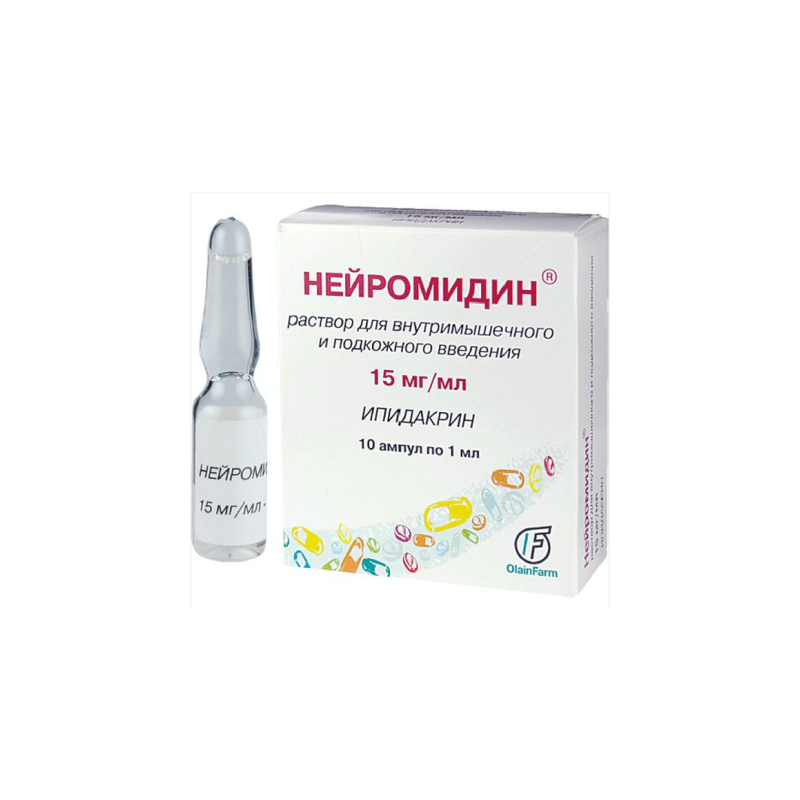



 All payments are encrypted via SSL
All payments are encrypted via SSL
 Full Refund if you haven't received your order
Full Refund if you haven't received your order
Solution for i / m and s / to introduction
Ipidacrine 15 mg
Excipients: hydrochloric acid, water d / and.
10 pieces
NEUROMIDIN is a reversible inhibitor of cholinesterase, directly stimulates the conduction of an impulse in the neuromuscular synapse and in the central nervous system due to the blockade of potassium channels of the membrane. Enhances the effect on smooth muscles of acetylcholine, adrenaline, serotonin, histamine and oxytocin.
Neuromidin® improves and stimulates neuromuscular transmission; improves conductivity in the peripheral nervous system, impaired by injury, inflammation, exposure to local anesthetics, some antibiotics, potassium chloride; enhances the contractility of smooth muscle organs under the influence of agonists of acetylcholine, adrenaline, serotonin, histamine and oxytocin receptors, with the exception of potassium chloride; improves memory.
- diseases of the peripheral nervous system (including neuritis, polyneuritis, polyneuropathy, polyradiculopathy, myasthenia, myasthenic syndrome of various etiologies);
- bulbar paralysis and paresis;
- recovery period of organic lesions of the central nervous system, accompanied by motor impairment;
- complex therapy of demyelinating diseases;
- intestinal atony.
- epilepsy;
- vestibular disorders;
- extrapyramidal diseases with hyperkinesis;
- angina pectoris;
- severe bradycardia;
- bronchial asthma;
- peptic ulcer of the stomach or duodenum in the acute phase;
- obstruction of the intestine or urinary tract;
- pregnancy;
- lactation period (breastfeeding);
- childhood;
- hypersensitivity to the drug.
Use with caution in gastric ulcer and duodenal ulcer, thyrotoxicosis, diseases of the cardiovascular system, as well as in patients with obstructive diseases of the respiratory system in history or in acute diseases of the respiratory tract.
The dose and duration of treatment with Neuromidin is determined individually, depending on the severity of the disease.
Peripheral nervous system diseases, myasthenia gravis and myasthenic syndrome
Inside the drug is prescribed for 10-20 mg (0.5-1 tab.) 1-3 times / day. Parenteral drug is used in the / m or s / to 5-15 mg 1-2 times / day.
The course of treatment is from 1 to 2 months. If necessary, the course of treatment can be repeated several times with a break between courses of 1-2 months.
Prevention of myasthenic crises in severe neuromuscular conduction disorders
1-2 ml (15-30 mg) of 1.5% Neuromidin solution for injection are briefly injected parenterally, then the treatment is continued with pills - the dose can be increased to 20-40 mg (1-2 tablets) 5 times / day.
Treatment and prevention of intestinal atony
Inside the drug is prescribed 20 mg (1 tab.) 2-3 times / day for 1-2 weeks. If the next dose was not taken on time, it should not be taken additionally.
The maximum daily dose is 200 mg.
When administered parenterally, the initial dose of the drug is 10-15 mg / day for 1-2 weeks. The dose of the drug can be increased to 30 mg / day.
Reactions due to the stimulation of m-cholinergic receptors: salivation, increased sweating, palpitations, nausea, diarrhea, jaundice, bradycardia, epigastric pain, increased secretion of bronchial secretions, convulsions. Salivation and bradycardia can be reduced by m-anticholinergics (including atropine).
When using the drug in high doses: dizziness, headache, vomiting, general weakness, drowsiness, skin allergic reactions (itching, rash). In these cases, reduce the dose or briefly (1-2 days) interrupt the drug.
The drug has no mutagenic, carcinogenic and immunotoxic action. Does not affect the endocrine system.
The patient should inform the doctor about taking other medicines, the appearance of side effects during treatment with Neuromidin.
Use in pediatrics
Use of the drug in children is contraindicated.
Influence on ability to drive motor transport and control mechanisms
During treatment, one should refrain from driving a car, as well as engaging in potentially hazardous activities that require high concentration of attention and psychomotor speed.
Neuromidin® enhances sedation in combination with CNS depressant medications.
The effect of the drug and side effects are enhanced when combined with other cholinesterase inhibitors and m-cholinomimetic agents.
In patients with myasthenia, the risk of a cholinergic crisis is increased, while the use of Neuromidin with other cholinergic agents.
The risk of developing bradycardia increases if beta-blockers are used prior to the initiation of treatment with Neuromidin.
The drug can be used in combination with Cerebrolysin.
Ethanol enhances the side effects of the drug.
Neuromidin® weakens the inhibitory effect on the neuromuscular transmission and conduction of excitation along the peripheral nerves of local anesthetics, aminoglycosides, potassium chloride.
Symptoms: loss of appetite, bronchospasm, lacrimation, increased sweating, constriction of pupils, nystagmus, increased gastrointestinal motility, spontaneous defecation and urination, vomiting, jaundice, bradycardia, intracardiac conduction disturbance, arrhythmias, reduction of blood pressure, anxiety, arousal, arousal, disturbance, aphoria, arousal, aeration convulsions, coma, speech disorders, drowsiness, general weakness.
Treatment: gastric lavage, the use of m-anticholinergics (including atropine, cyclodol, metacin), symptomatic therapy.
At a temperature not higher than 25 ° С.
Neuromidine